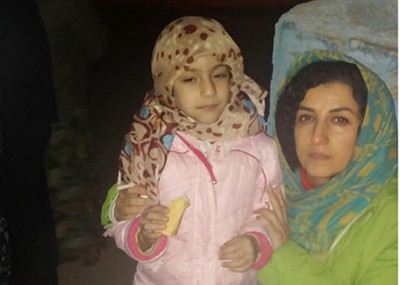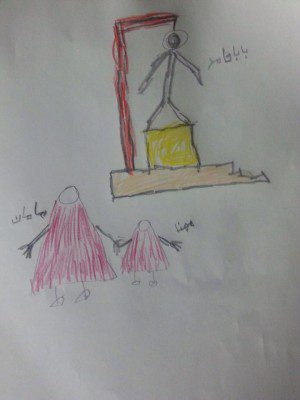Picture: Orla 2011/Shutterstock.com
We rarely hear a first-hand account of those languishing on death row in Iran. But a letter has just emerged from Hamed Ahmadi, a man executed on Wednesday 4 March after a grossly unfair trial. It gives a rare glimpse of the agony endured by those prisoners who know all is about to end.
“It is all finished”, the guard said, confirming the worst.
On the other side of the thick brick wall of Raja’i Shahr prison in Karaj, west of Teheran, are the bodies of six Sunni men from Iran’s Kurdish minority, each hanging from a noose.
Hamed Ahmadi, Jahangir Dehghani, Jamshid Dehghani, Kamal Molaee, Hadi Hosseini and Sediq Mohammadi had been sentenced to death in 2012 after being convicted of the vaguely worded offence of “enmity against God” (moharebeh).
Iran’s Supreme Court upheld the death sentences in 2013 even though the men denied any involvement in armed or violent activities, saying they were targeted solely because they practiced or promoted their faith. The authorities refused to review their cases despite changes to the penal code that should have allowed them to do so.
Their exhausted relatives, who had been standing by the prison’s door throughout the night, desperately pleading with the authorities not to carry out the executions could do nothing but cry — the prison guards taunting them and shouting insults.
They said they could not help but think of the last words they had exchanged with their loved ones, at a brief meeting on Tuesday , albeit while the men were bound by chains and shackles.

Now all that is left is a letter from Hamed Ahmadi, in which he paints a grim picture of his last five years on death row, living with the constant threat of execution, before his life was taken away.
“On a cold autumn morning in November 2012, they woke me up and told me that I would be transferred to Sanandaj prison, [Kordestan province]. The usual practice was that those who had been sentenced to death were moved only for the implementation of their sentence. I felt the shadow of execution over my head. The whole ward gathered together. Back then there were 10 people on death row. Some were crying, some were deep in their thoughts. We thought that maybe they were just transferring us but the humiliating looks of the guards said something different. They blindfolded and handcuffed the 10 of us, and pushed us into a bus while shouting insults.
I tried to think about my good memories to boost my spirits but it is hard to think about happiness when you are only a step away from death. When we arrived, they took us off the bus and threw our belongings on the ground. It was raining and the ground was covered in mud. They replaced our metal handcuffs with plastic ones but tied them so tight that the hands of some of my fellows started to bleed. They removed our blindfolds and took us to a room with walls covered by handwritten notes from people on death row who had been taken there before their execution. We washed for prayers and started to pray seeking peace and solace.
I started to wonder if I was ever going to see my daughter again. She was born when I could not be beside her. I asked God to give forbearance to my family and wished they would let me at least say goodbye to them.
The door opened. Our hearts started to pound. The nightmare of death was coming true. They separated us from one another. Our spirits were going down and our fears were rising. Time was passing slower than our entire life. The night before, the TV had broadcast a documentary about us. Everyone was of the view that this was a sign that our sentence was going to be implemented soon.
But 45 days went by. Every day, we thought we would be executed the next day but no one came for us. We approached death 45 times. We said good-bye to life 45 times.
Just when we started to become hopeful that we were not going to be executed, when we could start thinking about life again, our names were announced in the list of transferees to Raja’i Shahr prison. Again the nightmare of death. Again the repetition of the image of a man dangling from a noose in our head. There, they gave us light blue clothes that are for those who will be executed. The image of the execution scene did not leave me for a second. Three days passed.
I became completely disoriented. My brain did not work anymore.
I banged on the door non-stop and yelled for someone to come and answer my questions: Why are we here? My family is worried. At least allow me to make a phone call. Finally, I was allowed to make a call. My sister started crying as soon as she heard my voice: “You are alive? The MP for Sanandaj Salar Mohammadi has called and said all 10 of you have been executed.” They had held a funeral ceremony for us.
I then called my brother. He was in front of the prison. I asked if he had heard about the six persons who were not with us. He cried and said: They hanged them today and didn’t return the bodies. I lost control and started crying and yelling. The guys I had lived with in a cell for three and a half years were no longer in this world. I could not believe it. I felt wrecked and destroyed. None of them had been able to even say goodbye to their families.
Execution followed me and my family every second. My family was executed with me over and over. If they had not received news from me for one day, they would come to the prison immediately thinking that we are finished… We were left in this situation where every minute felt like we had a noose put around our neck.”

These are the last words Hamed’s relatives have from him.
It’s shocking but commonplace.
Iran carries out more executions than any other country in the world except for China. In 2013 alone, the Iranian authorities acknowledged having executed 369 prisoners although the real figure is believed to be more than 700 with many executions taking place unreported or in secret.
Ethnic and religious minorities are disproportionately affected by these executions which frequently follow unfair trials where “confessions” extracted through torture and other-ill-treatment are admitted as evidence.
In less than a month, Iran will appear before the United Nation’s top Human Rights body to announce its position on the recommendations it received during the country’s Universal Periodic Review (UPR) for the improvement of its dire human rights situation. One can only wonder how the Iranian authorities expect to be taken seriously when there is such a contrast between their rhetoric at the UN and the human rights violations that they regularly sanction at home.
A version of this feature was originally published on Vice.com
For more information, see:
Iran: Last chance to spare lives of six Sunni men on death row (News Story, 3 March 2015)


